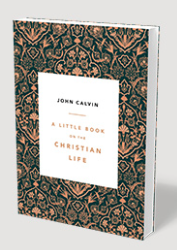Written By : Jacob Jones
Managing Editor
An excerpt from John Calvin’s Institutes of the Christian Religion (before anyone gets their knickers in a twist, this book does not concern predestination), the chapter addressed in this review is Calvin’s brief overview of the Christian’s walk in faith. Calvin’s Institutes saw many additions in his lifetime, and the content of this booklet was included in the second edition published in 1539.
The importance and universal nature of this particular chapter of his Institutes was recognized shortly after that publication, and this particular chapter “On the Life of a Christian man” was translated and published independently of the Institutes almost immediately after the publication of the whole work. That excerpt, often called “the Golden Booklet,” continues to be valued apart from the Institutes nearly 500 years later.

Though five centuries have passed between this book’s origin and now, every word fits perfectly with our world today, and the struggles of the modern Christian life (there is nothing new under the sun – Ecc. 1:9). The effectiveness of Calvin’s writing in this chapter could be from his use of God’s Word just as often as his own words.
In essence, he says that we are incapable of obeying God without denying ourselves, because our will and His are not in agreement. In the interest of self-denial, Calvin claims that “Scripture orders us to live with men in such a way as to prefer their honor over our own,” which is contrary to what most worldly sources would say. True biblical humility comes only by an understanding that everything good about oneself comes as a free gift from God.
The first section is of the book is “Scripture’s Call to Christian Living,” and it points out a myriad of verses in the Bible that make it clear that God intends the Christian life to be holy, meaning set apart and different. The other four sections of the book are focused on exactly how we are to be different from non-believers. The answer is by denying ourselves and attempting to conform to the perfect model of Christ.
He also takes on secular philosophy, arguing that the biblical answer to any life question is better than the best secular approach. Calvin comments, “Scripture has its own order and plan that is more beautiful and certain than any philosophical method.” He offers that Christians must put their “deceitful desires” to death, and focus on the love of righteousness.

The most impactful section, especially to America today, is Calvin’s section on self-denial. He uses Scripture to make it very clear that we are a “living sacrifice” to God, and this means that Christians are not called to be comfortable, but to deny ourselves and follow Him. If the objective of Christian living is to become as Christ-like as possible, then trial and persecution are simply par for the course.
Not only are we to be living sacrifices, but also have a Christ-like spirit of humility, and realize that “every good thing about ourselves is a free gift from God.” Self-denial means realizing that serving others is not a “favor” that we are paying to God or that person, but an obligation that should come freely from a spirit of love for others.
After making his case for self-denial, Calvin’s third point is that bearing our cross is part of self-denial. Christ tells us “take up your cross and follow me,” and we should obey that command with a spirit of thankfulness. Many acknowledge that we are called to carry our cross, but some do not properly define “our cross,” and still others do acknowledge the attitude with which we are to carry it. The simple statement that the life of the believer is not meant to be comfortable drives home the point that we are called to deny ourselves. Even our human reason should not dominate our plans, instead we should follow God’s Word even when it does not agree with our reasoning.
Calvin is careful to temper his statement with the fact that we are not meant to be Stoics.
We see that bearing the cross does not mean that a person is robbed or stupefied of every feeling of sorrow. The Stoics of old foolishly idolized such a person… they painted a picture that can never be found, or exist, among men… New Stoics think it a vice to groan and weep… [but] Our Lord groaned and wept. – Calvin p.77-8
Although we are to carry our crosses with the attitude that we are enduring training to make us fit for the kingdom, we are also allowed apprehension, just as Christ asked for the cup to pass from Him if it be God’s will.
The relevance and importance of this book to every believer cannot be overstated. As implied by the title, it is not a large book, so it is not a difficult read, and well worth the effort. The ideas that are imparted by this book will make you think deeply about your faith and help you put that faith into practice as we should. However, be warned, this book will challenge you spiritually and you cannot unread the convicting words. Read at your own risk.
BIO:
Jacob B. Jones is a co-managing editor of the Bryan Triangle. He is also a sophomore majoring in Criminal Justice and minoring in both Journalism and Psychology. Although stuck in class most of the day, he would rather be outdoors anytime. His post graduate plans include military and law enforcement, most likely in that order. In his spare time (as if that exists in college), Jacob coordinates volunteers at the Blazing Hope Ranch, and somehow finds the time to play rugby in the fall.



